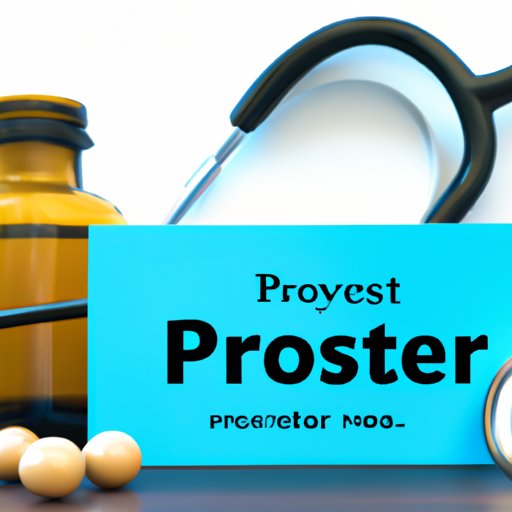Introduction
Maintaining a healthy prostate is essential for men of all ages. The prostate is a small gland located in the male reproductive system that produces seminal fluid and helps transport sperm during ejaculation. As men age, their risk of developing prostate cancer and other prostate-related illnesses increases. Fortunately, there are steps men can take to promote prostate health, such as eating a balanced diet, exercising regularly, limiting alcohol consumption, practicing stress reduction techniques, taking supplements, and scheduling regular check-ups with a doctor.
Eating a Balanced Diet
A balanced diet is essential for maintaining good prostate health. Foods that are high in antioxidants, such as fruits and vegetables, can help protect against free radical damage that can lead to cancer. Additionally, foods that are rich in zinc, like oysters, beef, and spinach, can help reduce the risk of enlarged prostate. Omega-3 fatty acids, found in fish, nuts, and seeds, have anti-inflammatory properties that can help reduce inflammation in the prostate.
Ensuring that one is getting all the necessary nutrients is also important. Vitamins A, C, D, and E are all beneficial for prostate health. Vitamin B6 may also help reduce the risk of prostate cancer. Eating a variety of whole grains, legumes, nuts, and seeds can help ensure one is getting all the necessary nutrients.
Regular Exercise
Exercise is another important factor in prostate health. Regular physical activity can help reduce the risk of prostate cancer and other prostate-related illnesses. Moderate aerobic activities, such as walking, biking, or swimming, are especially beneficial. Strength training exercises can also help improve prostate health by strengthening the muscles around the prostate.
Experts recommend that men aim for at least 30 minutes of moderate physical activity four to five days a week. It’s important to listen to one’s body and not overexert oneself while exercising.
Limiting Alcohol Consumption
Alcohol consumption can have an effect on prostate health. Too much alcohol can increase the risk of developing prostate cancer and other prostate-related illnesses. The recommended limit for men is no more than two drinks per day. It’s important to note that this limit applies to all types of alcoholic beverages, including beer, wine, and spirits.
If one does choose to drink alcohol, it’s important to do so responsibly and in moderation. Drinking too much can have serious consequences, both for one’s health and overall wellbeing.
Practicing Stress Reduction Techniques
Stress can have an effect on prostate health. Practicing stress reduction techniques can help reduce stress levels and in turn, reduce the risk of developing prostate cancer and other prostate-related illnesses. Examples of stress reduction techniques include yoga, meditation, deep breathing exercises, progressive muscle relaxation, and journaling.
These activities can help lower blood pressure, reduce anxiety, and improve mood. It’s important to find what works best for each individual and make time to practice these activities regularly.
Taking Supplements for Prostate Health
In addition to eating a balanced diet and exercising regularly, some men may consider taking supplements to support prostate health. Supplements such as saw palmetto, green tea extract, and pygeum africanum have been shown to be beneficial for prostate health. However, it’s important to consult a doctor before beginning any new supplement regimen.
Supplements may interact with medications or other treatments, so it’s important to talk to a doctor about the potential risks and benefits before starting any new supplement.
Scheduling Regular Check-Ups
It’s important for men to schedule regular check-ups with their doctor. During these check-ups, the doctor will likely perform tests and screenings to check for any signs of prostate cancer or other prostate-related illnesses. These tests may include a digital rectal exam, a prostate-specific antigen (PSA) test, and/or an ultrasound.
Experts recommend that men over the age of 50 should schedule a check-up every year, while men between the ages of 40 and 49 should schedule a check-up every two years. It’s important to discuss any concerns or symptoms with a doctor and get tested regularly.
Conclusion
Having a healthy prostate is important for men of all ages. Eating a balanced diet, exercising regularly, limiting alcohol consumption, practicing stress reduction techniques, taking supplements, and scheduling regular check-ups with a doctor can all help promote prostate health and reduce the risk of developing prostate cancer and other prostate-related illnesses.
(Note: Is this article not meeting your expectations? Do you have knowledge or insights to share? Unlock new opportunities and expand your reach by joining our authors team. Click Registration to join us and share your expertise with our readers.)
